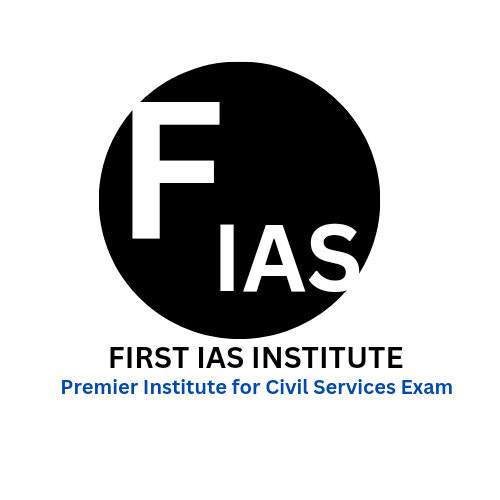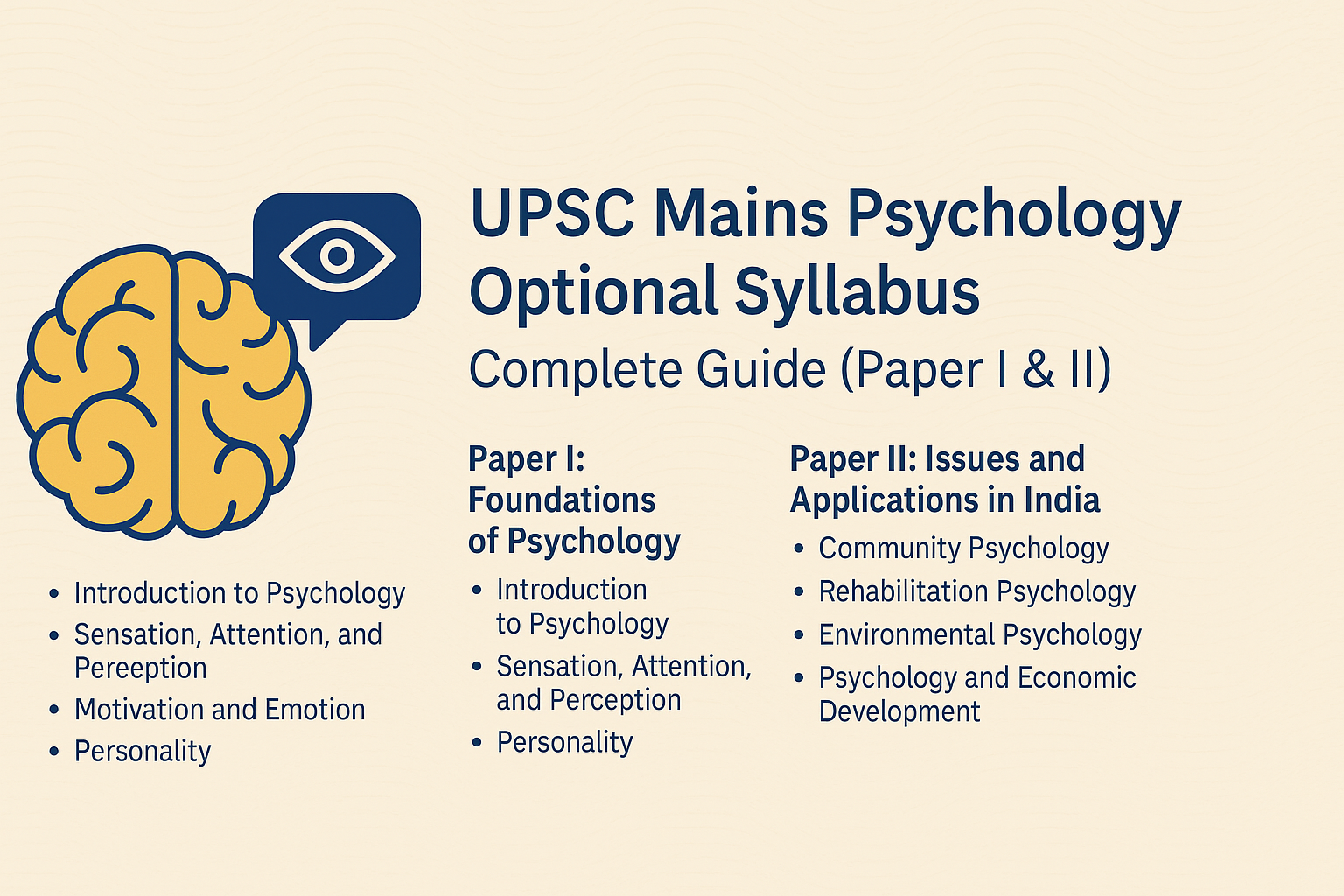UPSC Mains Psychology Optional Syllabus: Complete Guide (Paper I & II)
The Psychology Optional is a popular choice in the UPSC Civil Services Mains Examination due to its scientific yet intuitive nature. The syllabus is divided into two papers—Paper I (Foundational Concepts and Theories) and Paper II (Application of Psychology in Indian Context).
Below is the detailed and descriptive syllabus to guide your preparation.
Join WhatsApp community for Free Notifications, Updates, Study Material, Mock Tests, Internship Updates, and Current Affairs - CLICK HERE TO JOIN
Paper I: Foundations of Psychology (Theoretical and Scientific Aspects)
This paper primarily deals with the basic psychological concepts, theories, and principles. It focuses on the scientific understanding of human behavior.
1. Introduction to Psychology
- Definition and Scope of Psychology
- Study of behavior and mental processes.
- Psychology as a science—objective observation and experimentation.
- Historical Foundations
- Structuralism, Functionalism, Psychoanalysis, Behaviorism, Humanism, Cognitive Revolution.
- Branches of Psychology
- Clinical, Social, Cognitive, Developmental, Industrial-Organizational, Health Psychology.
- Application of Psychology
- Role in everyday life, education, health, military, and industry.
2. Methods of Psychology
- Experimental Method
- Independent and dependent variables, control groups, randomization.
- Observation
- Naturalistic vs. Controlled observation, participant and non-participant methods.
- Interview and Survey
- Structured and unstructured interviews, questionnaire design, survey techniques.
- Case Study Method
- In-depth analysis of individual cases in clinical psychology.
- Correlation and Causation
- Positive and negative correlations, limitations of correlational studies.
- Statistical Tools
- Mean, median, mode, standard deviation, t-tests, ANOVA.
3. Development of Human Behavior
- Heredity and Environment
- Nature vs. nurture debate, gene-environment interactions.
- Lifespan Development
- Cognitive, emotional, and moral development from infancy to old age.
- Developmental Theories
- Piaget’s Cognitive Development, Erikson’s Psychosocial Stages, Kohlberg’s Moral Reasoning.
4. Sensation, Attention, and Perception
- Sensory Processes
- Visual, auditory, olfactory, tactile, and gustatory senses.
- Attention
- Selective and divided attention, factors influencing attention.
- Perception
- Principles of perceptual organization (Gestalt), depth perception, illusions.
- Extrasensory Perception (ESP)
- Parapsychology and controversies.
5. Learning
- Classical Conditioning (Pavlov)
- Unconditioned/conditioned stimulus and response.
- Operant Conditioning (Skinner)
- Reinforcement, punishment, schedules of reinforcement.
- Cognitive Learning
- Insight learning (Köhler), observational learning (Bandura).
- Transfer of Learning
- Positive, negative, and zero transfer.
6. Memory
- Processes of Memory
- Encoding, storage, retrieval.
- Types of Memory
- Sensory, short-term (STM), long-term memory (LTM).
- Theories of Forgetting
- Decay theory, interference theory, retrieval failure.
- Mnemonics and Memory Improvement Techniques
7. Thinking and Problem Solving
- Concept Formation
- Prototypes, schemas.
- Reasoning
- Inductive, deductive, analogical reasoning.
- Problem-Solving Strategies
- Heuristics, algorithms, mental set, functional fixedness.
- Creativity
- Divergent thinking, factors influencing creativity.
8. Motivation and Emotion
- Theories of Motivation
- Drive Reduction, Arousal, Maslow’s Hierarchy of Needs.
- Biological and Social Motives
- Hunger, thirst, sex; achievement, affiliation, power.
- Theories of Emotion
- James-Lange, Cannon-Bard, Schachter-Singer, Lazarus Cognitive Appraisal Theory.
- Emotional Intelligence
- Components, measurement, significance in decision making.
9. Personality
- Definition and Characteristics
- Individual differences, consistency across situations.
- Theories of Personality
- Psychoanalytic (Freud), Trait (Allport, Cattell), Humanistic (Rogers, Maslow), Social-Cognitive (Bandura).
- Assessment Techniques
- Projective tests (TAT, Rorschach), inventories (MMPI, 16 PF).
10. Intelligence and Aptitude
- Concepts of Intelligence
- IQ, emotional intelligence, multiple intelligences (Gardner), triarchic theory (Sternberg).
- Theories of Intelligence
- Spearman’s g-factor, Thurstone’s primary abilities.
- Measurement of Intelligence
- Standardized tests, reliability, and validity.
- Aptitude Testing
- Use in career guidance, educational placement.
11. Attitudes, Values, and Interests
- Attitude Formation and Change
- Conditioning, cognitive dissonance, persuasion.
- Measurement of Attitudes
- Likert scale, semantic differential scale.
- Values
- Nature, types, and measurement.
- Interests
- Vocational interests and their assessment.
12. Language and Communication
- Structure of Language
- Phonemes, morphemes, syntax, semantics.
- Language Acquisition
- Theories (Chomsky’s nativist theory, Skinner’s learning theory).
- Communication Process
- Verbal and non-verbal communication, barriers, feedback.
13. Issues and Perspectives in Modern Psychology
- Emerging Fields
- Positive psychology, health psychology, cognitive neuroscience.
- Cultural and Gender Issues in Psychology
- Biases in psychological research and practice.
Join WhatsApp community for Free Notifications, Updates, Study Material, Mock Tests, Internship Updates, and Current Affairs - CLICK HERE TO JOIN
Paper II: Psychology – Issues and Applications in India
Paper II is more applied in nature and India-specific. It emphasizes the use of psychological principles in societal, clinical, organizational, and developmental settings.
1. Psychological Measurement of Individual Differences
- Testing and Standardization
- Principles, norm-referenced vs. criterion-referenced testing.
- Psychological Testing in India
- Challenges in adaptation and standardization.
2. Community Psychology
- Concept and Relevance
- Understanding social issues, marginalized communities.
- Intervention Strategies
- Community mental health, prevention programs, participatory approaches.
3. Rehabilitation Psychology
- Definition and Scope
- Psychosocial rehabilitation for differently-abled, victims of violence, substance abuse.
- Counseling and Vocational Rehabilitation
4. Organizational Behavior and Psychology
- Personnel Selection and Training
- Job analysis, selection tools, performance appraisal.
- Motivation and Morale
- Theories of work motivation, job satisfaction.
- Leadership and Group Dynamics
- Leadership styles, team-building, group decision-making.
- Organizational Climate and Culture
- Impact on productivity and well-being.
5. Educational Psychology
- Classroom Learning and Motivation
- Techniques for effective learning, teacher-student interaction.
- Learning Disabilities
- Dyslexia, ADHD, and their interventions.
- Gifted and Slow Learners
- Identification and tailored educational strategies.
- Educational Counseling and Guidance
6. Psychology and Social Integration
- Disadvantaged Groups
- SCs, STs, women, religious minorities—issues and psychological implications.
- Strategies for Empowerment and Inclusion
- Policy initiatives, psychological interventions.
7. Environmental Psychology
- Human-Environment Interaction
- Effects of urbanization, crowding, noise, pollution.
- Sustainable Behavior
- Promoting eco-friendly habits and attitudes.
8. Application of Psychology to Health
- Health Behavior
- Stress, coping, health-promoting behaviors.
- Chronic Illness and Terminal Illness
- Psychological support, hospice care.
- Community Health Interventions
- Mental health campaigns, behavioral health programs.
9. Application of Psychology to Welfare of Special Categories
- Children with Special Needs
- Intellectual disabilities, autism spectrum disorders.
- Elderly
- Aging process, loneliness, cognitive decline.
- Prisoners and Juvenile Delinquents
- Correctional psychology, rehabilitation strategies.
10. Application of Psychology in Armed Forces
- Selection and Training
- Psychological screening tools.
- Coping with Combat Stress
- PTSD, resilience training.
11. Application of Psychology in Sports
- Enhancing Performance
- Goal-setting, visualization, team cohesion.
- Coping with Injuries and Setbacks
- Mental conditioning, recovery strategies.
12. Psychology and Information Technology
- Cyberpsychology
- Internet addiction, social media behavior.
- Human-Computer Interaction
- Interface design, ergonomics.
13. Psychology and Economic Development
- Behavioral Economics
- Decision-making, nudges, consumer behavior.
- Entrepreneurial Psychology
- Motivation, innovation, risk-taking behavior.
14. Application of Psychology in Media
- Impact of Mass Media
- Stereotyping, aggression, prosocial behavior.
- Media Psychology
- Public opinion formation, agenda-setting.
Join WhatsApp community for Free Notifications, Updates, Study Material, Mock Tests, Internship Updates, and Current Affairs - CLICK HERE TO JOIN
Final Thoughts
The Psychology Optional offers a blend of conceptual clarity and real-world application. It allows aspirants to explore human behavior in depth, making it an enriching subject. A clear understanding of each topic, combined with applied insight—especially in the Indian context—can lead to high scores in UPSC Mains.


 firstiasofficial@gmail.com
firstiasofficial@gmail.com
Leave a Comment